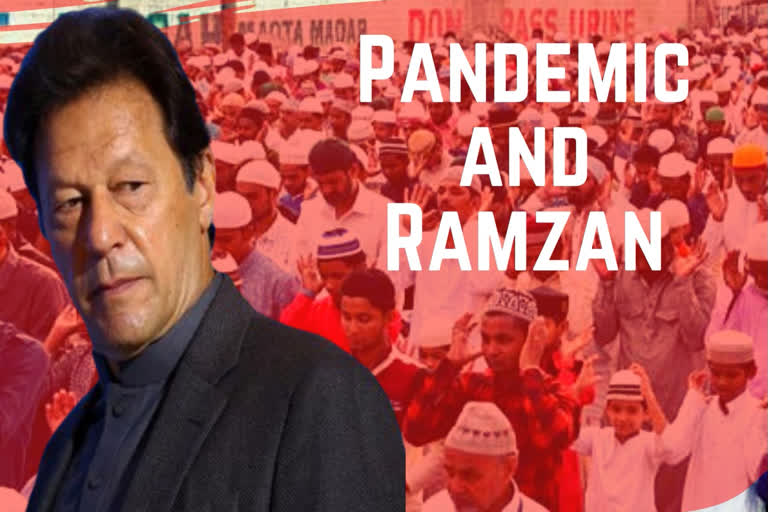New Delhi:Long years back, one of the most well-known of theoretical physics and 1965 Nobel laureate Richard Feynman had said: "Religion is a culture of faith, science is a culture of doubt." So with differing belief systems, it is no wonder that contradictions arise every now and then.
And what could be a more idealistic setting for such a conflict than in Pakistan?
With a pandemic furiously raging across the world, Pakistan Prime Minister Imran Khan had to finally rescind his earlier order asking people not to crowd in mosques in order to maintain social distancing and had to yield to the demands of the powerful clergy or the 'ulema'.
The gathering at mosques during Ramzan, a month of dawn-to-dusk fasting, piety and prayers, is an integral part because of 'Taraweeh' or special community prayers in the evenings during the Holy month, especially to seek pardon from the Almighty.
Faced with the prospect of economic doldrums for an economy that was perched on the precipice, the Pakistani government did not have much option other than to ease the nationwide lockdown so that certain industries, factories and workplaces could function.
But that has only served to anger a section of the clerics or the 'ulema' who question if factories and offices can be opened up why not mosques?
For the Pakistani 'ulema', huge gatherings at its beck and call at the mosques are a demonstration and highlighting of the power it wields over the masses, an opportunity to underline the intensity and depth of its power. The spread of the pandemic be damned.
A panel of top doctors of the country has already written to Prime Minister Khan asking him to implement the earlier order and not to allow mosque gatherings in the country that is already facing acute shortage of medical equipment to treat the infected. As of now, Sindh is the only province to have continued with the lockdown.
PM Khan’s obvious intent to implement a shutdown has been tacitly backed by the powerful Army. On Friday, Major General Babar Iftikhar, DG, Inter-Services Public Relations (ISPR), said the Army is focused on a 'smart lockdown, and testing, tracing and quarantining' for the virus hotspots and clusters. Urging people to restrict their movement outside, he said: "Next 15 days are crucial. Make your homes your places of worship."
As of Friday, Pakistan had more than 11,500 COVID 19 positive cases while 242 people had died due to the infection.
Meanwhile, in almost all Muslim nations across the world, this Ramzan is expected to be a subdued and low key affair with no customary meetings and get-togethers of relatives and friends over a lavish evening 'iftaar'.
Even in Saudi Arabia, the authorities have allowed shortened 'Taraweeh' prayers during Ramzan at the Grand Mosque in Mecca and the Prophet’s Mosque Medina without any public congregation.
Shadowed by the fears of the contagion, the subdued spirit is evident in other Muslim countries be it Indonesia, Malaysia, Egypt, Iraq, Syria, Lebanon, Somalia and all the others with the 'stay at home, pray at home' being the dominant theme for this Ramzan.
Read:|Minimizing ways of transmission and herd immunity can stop coronavirus, says Amit K Maiti
